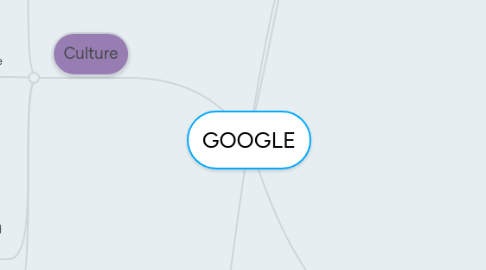
1. Leadership
1.1. Arguments about who would take on leadership roles within groups
1.2. Taking part in voluntary competitions shows initiative
1.3. Experiences can affect managers (leaders) perspectives, actions and views
1.4. Skills of a manager (Katz)
1.4.1. Technical skills
1.4.1.1. "He is talented at managing technical workers...Matt has thrived at Google"
1.4.2. Human skills
1.4.2.1. "He hadn't picked up on this discontent"
1.4.2.2. "He wanted everyone to feel fulfilled by their work"
1.5. Functions of a manager (Fayol)
1.5.1. Members of Matt's team didn't understand clearly the role of the team
1.5.2. Planning (defining goals)
2. Communication
2.1. "We felt like we could say anything to each other"
2.1.1. Helps foster good workplace culture
2.1.2. Could help reduce tensions within teams
2.1.3. Allows for easy flow of ideas, thus better work
2.2. Not fully effective communication within workplace hierarchy
2.2.1. "When asked to rate whether the role of the team was clearly understood...members of the team gave middling to poor scores"
2.2.2. "He [Matt] hadn't picked up on this discontent"
2.2.3. What the manager thinks might be going on isn't necessarily right and the lack of effective communication may be hindering it from improving
3. Culture
3.1. Need to try and create a culture that maximises personal and group productivity
3.1.1. "Employees had talked about how various teams felt"
3.1.1.1. How employees feel in their workplace greatly affects culture, morale, efficiency, productivity and effectiveness
3.1.2. Job related attitudes (satisfaction, involvement and organisation commitment)
3.2. Desirable vs undesirable workplace culture
3.2.1. Affects employee performance and happiness
3.2.2. "Interesting but lonely"
3.2.2.1. "Wanted to find a job that was more social"
3.2.2.2. Can lead to a decrease in motivation and possibly loyalty to the company
3.2.3. "I wanted to be part of a community, part of something people were building together"
3.2.3.1. Employees are more likely to be loyal and produce better work if they feel connected to what they are doing
3.2.4. "I always felt like I had to be careful not to make mistakes around them"
3.2.4.1. Source of stress
3.2.5. "Our technology saturated age enables us to examine our work habits with detailed scrutiny"
3.2.5.1. Allows companies like Google to gain a better understanding/research more about what makes good and bad workplace culture
3.3. Well designed teams both contribute to a good culture and are made due to good culture
3.3.1. "Google became focused on building the perfect team"
3.4. "The technology industry...[was] increasingly the world's dominant commercial culture"
4. Management Theory
4.1. The growing importance of working in teams
4.1.1. There is "increasing demand for employees who need to be able to understand and work within group dynamics"
4.1.2. Emphasis needs to be placed on team-focused learning
4.2. More and more research is being done about how teams/groups work
4.2.1. "Researchers are devoting themselves to studying everything from team composition to email patterns"
4.2.2. "The company's [Google] top executives long believed that building the best teams meant combining the best people"
4.3. Group norms
4.3.1. "Understanding and influencing groups norms were the keys to improving Google's teams"
4.4. Fayol, Mintzberg, Katz
4.5. Distorted attributions
4.5.1. "He thought of the team as a strong unit. But the results indicated there were weaknesses"
4.5.2. Selective perception
4.5.3. Fundamental attribution error
4.5.3.1. Team may look like it is working/successful but there could be underlying problems
5. Groups & Teams
5.1. "Study group carefully planned to foster tight bonds"
5.1.1. Sometimes helpful if there is tight bonds within groups as it can allow for easier communication and less stress however, not all groups that are planned actually do lead to close bonds
5.2. Attributes that lead to a good mix of people?
5.2.1. "They had a lot in common...had gone to similar universities and had worked at comparable firms. These shared experiences, Julia hoped, would make it easy for them to work well together. But it didn't turn out that way"
5.2.2. Variety of professional experiences and backgrounds
5.2.3. "Each was composed of people who were bright and outgoing...it was only when they gathered as a team that things became troubled"
5.3. Team Dynamics
5.3.1. Can either help or hinder group performance
5.3.2. "No on worried that the rest of the team was judging them"
5.3.3. Source of stress
5.3.3.1. "I always felt like I had to prove myself"
5.3.3.2. "Put her on edge"
5.3.3.2.1. Source of stress
5.3.4. 5 factor personality model (canoe)
5.3.5. Arguments about who would be the leader
5.4. Formal work groups
5.4.1. Command groups
5.4.1.1. "Some groups sought strong managers"
5.4.2. Task groups
5.4.3. Cross-functional teams
5.4.4. Self-managed teams
5.4.4.1. "Others [groups] preferred a less hierarchical structure"
5.4.5. Project Aristotle
5.4.5.1. Sometimes friends who socialised outside of work were effective, other times strangers were better
5.5. Lack of cohesion
5.5.1. High goal alignment and high cohesiveness = strong productivity increase
